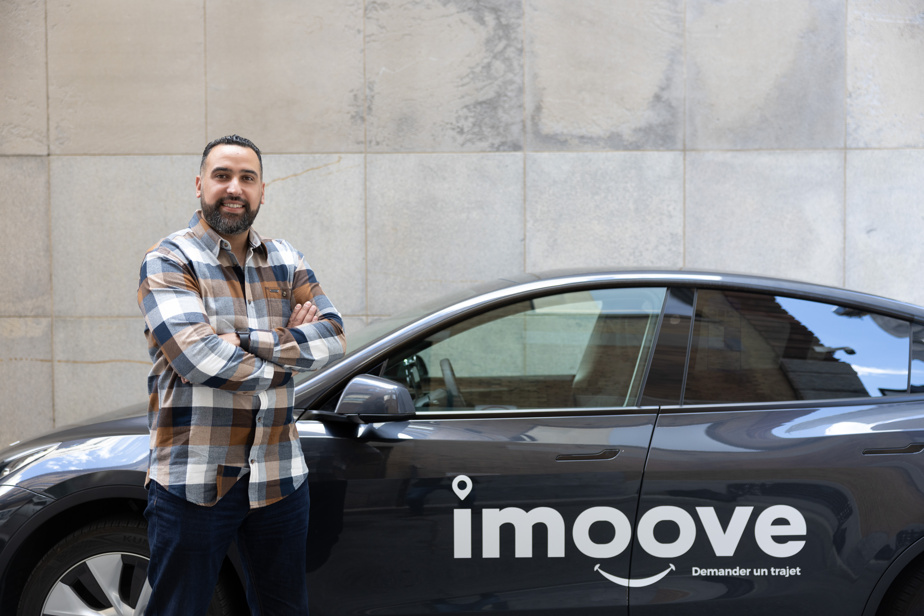The avenue seemed congested, but they took it without hesitation.
Brothers Mohammed and Driss Jamiloun have just launched the Imoove mobile application for passenger transport, which directly connects customers and drivers.
However, just as directly, Imoove enters into competition with traditional taxi companies and the Ubers of this world.
The two entrepreneurs knew, however, what a bumpy road they were taking: they were taxi drivers themselves and had traveled the urban washboards of Montreal.
“We really wanted to offer an economical option to Quebecers,” explains Driss Jamiloun. And at the same time, we wanted to find a solution that would allow drivers to earn more money. »
The Imoove application was launched on June 6 in Montreal, but it had been tested since February in the Lanaudière region.
“We started with 2 or 3 cars, then 10, then 15…” describes Driss Jamiloun.
Just two weeks after its official launch, 500 drivers have already signed up. “The registrations don’t stop! », the entrepreneur is surprised and delighted.
However, the initial objective was modest.
“At first, it was just to meet the needs of a traditional taxi company, which I still own,” says Driss Jamiloun.
The Montreal taxi driver reacted to the upheavals caused by Uber by creating his own regional company in 2020, Taxi des Moulins, which mainly serves the southwest of Lanaudière.
The company had up to fifteen cars, but the harsh technological reality caught up with it there too.
“That’s why we tried to do something that doesn’t yet exist here in Quebec, that is to say, to bring together the traditional taxi industry with an innovative application,” he says. “We decided to launch a new business model, with a lower rate than a taxi. »
In fact, Driss Jamiloun had been a Java developer. The application he had in mind was developed with the help of consultants.
For customers who want to get on board, Imoove, downloadable from the App Store or Google Play, has three main advantages, he lists.
If desired, the passenger can pay in cash on board the vehicle rather than with a bank or credit card on the application.
“Our pricing is based on mileage and wait time,” he adds.
Unlike a well-known application, “we do not have dynamic pricing based on supply and demand,” he argues. Our prices are consistent and stable.”
There are no fees for booking or cancellation. “For example, you book a taxi today for tomorrow, and you can, five minutes before the time, cancel, without any fees. »
The drivers also benefit from it, underlines the entrepreneur. “We are asking for a really advantageous commission for the drivers. We just take 10%. »
Drivers provide their own vehicle, which must not be more than seven or eight years old, depending on its condition. Verification is done online.
“The partner driver must send us all the necessary documents such as a mechanical inspection,” explains the co-founder of Imoove. We sometimes ask for photos of the vehicle, the mileage on the odometer, to ensure that it is the right vehicle and that it complies with all Quebec regulations. »
A local call center provides technical support. The company, whose head office is in Terrebonne, employs about ten people.
“Soon, we will have to open another branch in Montreal to facilitate contact with partner drivers,” informs Mr. Jamiloun.
For now, the service covers Greater Montreal, but depending on success, it could quickly be extended to other regions.
The race has barely started.
The manufacturer of heating, ventilation and air conditioning (HVAC) systems Annexair is increasing its investments, and therefore its installations. Its owner François Lemieux announced an investment of $30 million for the expansion of its buildings in Saint-Germain-de-Grantham, where the company moved in 2019. The factory will be expanded by an additional 14,000 m2 , to increase its total surface area to 46,500 m2. It will then be among the largest industrial buildings in Quebec, the company maintains. The investment also includes the purchase of new “state-of-the-art” production equipment, without this cutting-edge breaking the budget. Work is due to begin shortly and be completed in June 2025. François Lemieux plans to produce nearly 140 million HVAC systems in 2024 and already sees reaching 200 million in 2026.
The manufacturer of aerodynamic appendages for semi-trailer trucks Transtex has just acquired DClimate, an American manufacturer of auxiliary electric power units (APG). DClimate GAPs combine high-efficiency heating, ventilation and air conditioning (HVAC) modules with a patented battery management and fast charging system. They reduce the need to idle the engine when the truck is parked and its driver is at rest. “We firmly believe that DClimate’s APUs [GAP] have the potential to become the industry standard,” said Mathieu Boivin, CEO of Transtex founded in Montreal in 2005. The company moved its manufacturing activities in Indiana in 2012 to be closer to its strategic market. “Our production is based in Indianapolis, but our main headquarters for decision making is in Montreal, where our engineering, finance, human resources, marketing, quality and management departments are located,” explained by email Kristy Pealow, vice-president, international markets.
The French company VINCI Construction announced the acquisition of Entreprises Marchand
Mondata has closed a $17 million financing round led by the Fonds de solidarité FTQ with the participation of Mouvement Desjardins. These funds will allow it to launch on a large scale “Proactive Cybersecurity”, a new product that empowers users with regard to cybersecurity.




